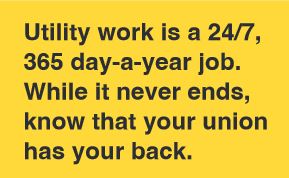We’re more than halfway through 2024 and what a year it’s been! Artificial intelligence and its implications have been an undercurrent in the conversations we’ve been having with members over the past few years. In response to your concerns about how AI may or may not impact UWUA members’ work, we take a deep dive on the technology in this edition’s cover story.
 The story explores several of the ways our members currently interact with AI tools on the job along with some of the ways we may experience AI technology in the future. When managed the right way, in partnership with our employers through something like an Emerging Technologies Committee — such as the one used by Local 1-2 — it’s possible for AI to be deployed as another tool in our toolbox, and not as a threat to our livelihoods. However, we’ve got to keep our ears to the ground with regard employers’ use of AI as much as we can.
The story explores several of the ways our members currently interact with AI tools on the job along with some of the ways we may experience AI technology in the future. When managed the right way, in partnership with our employers through something like an Emerging Technologies Committee — such as the one used by Local 1-2 — it’s possible for AI to be deployed as another tool in our toolbox, and not as a threat to our livelihoods. However, we’ve got to keep our ears to the ground with regard employers’ use of AI as much as we can.
The obvious and biggest concern is the employers out there who seek to use AI to take away our members’ jobs. When our staff are at the contract table next to you, we’re working hard to make sure that doesn’t happen.
We’re seeing AI most often today in UWUA call centers, but believe it or not, AI-powered robots have also entered the conversation. Check out the full story on page 6.
The How It’s Done series continues in this edition where we profile several UWUA members who work as substation operators in Pennsylvania, Ohio, Massachusetts and Wyoming. The article is insightful regardless of whether you’re in the utility sector or not.
For anyone looking to get into the electrical sector, you’ll be interested to hear more about the individuals’ respective paths into this role. For those who may work alongside substation operators, but in a different capacity, it might be helpful to have this insight into the demands substation operators face.
For those members with kids or grandkids who are interested in what it means to become a utility worker and how to get there, this series will be especially interesting to you. In particular, it will offer insight to high school students who are interested in what career paths may look like that don’t involve a college degree.
Earlier this summer, UWUA held two important and meaningful meetings in Pittsburgh, PA, which you’ll hear more about in this magazine edition. We invited all locals who have water industry members to collaborate and discuss some of the issues we face whether or not we share employers. This was the first meeting of all UWUA water locals, and it included productive discussions and collaborations.
The second meeting brought together many members of UWUA’s five committees. There was a certain energy in the room amongst this particular group of individuals who brimmed with new ideas. I look forward to seeing the committee members bring the visions for their respective committees to life over the coming months. Secretary-Treasurer Coleman’s column delves deeper into the meeting details.
Lastly, early voting in some states will begin soon. For the rest of us, Election Day is Tuesday, November 5. We cover a lot of ground in this magazine in an effort to share some information with our members regarding the issues at stake for working families this election. Check out Executive Vice President Dillon’s column for some insight on what Project 2025 is all about and Vice President Pinkham’s column about why locals should be engaged in politics at every level. In case you missed it, check out UWUA’s statement regarding our endorsement of Kamala Harris for president on our website.
Utility work is a 24/7, 365 day-a-year job. While it never ends, know that your union has your back — whether it’s bringing our best ideas to the bargaining table to tackle the challenges of AI, sharing insights about substation operators’ points of view or delivering information you need to engage in important political conversations.

